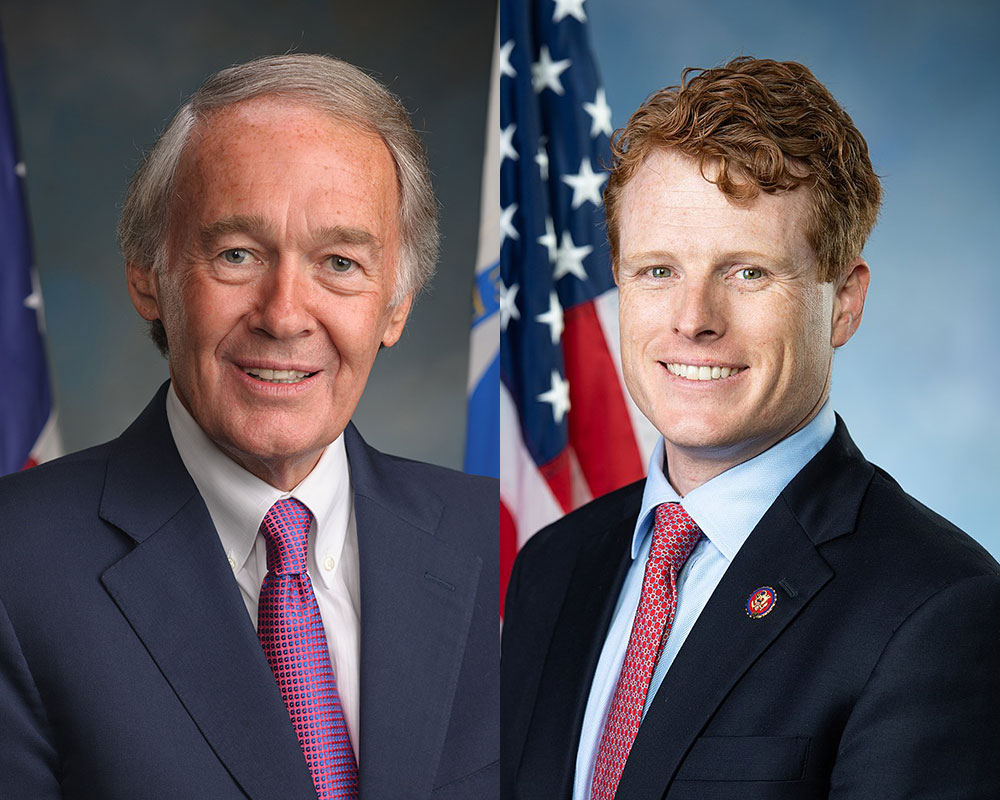Incumbent Sen. Edward Markey has opened up a double-digit lead over challenger U.S. Rep. Joseph Kennedy III one week before the Democratic primary in the race for U.S. Senate, according to a new poll of Massachusetts voters released Wednesday.
Conducted by the UMass Lowell Center for Public Opinion, the poll of 800 likely Democratic primary voters found that Markey leads the race with 52 percent of respondents supporting him, compared to 40 percent for Kennedy, with 6 percent of voters undecided and 2 percent favoring another candidate. The primary election is Tuesday, Sept. 1.
“Perhaps the most peculiar thing about this race is that the incumbent has been embraced by the outsider wing of the Democratic Party and the challenger has been characterized as an insider. This insider/outsider dynamic comes through clearly in that voters who trust government are much more likely to support Kennedy and those that distrust government are more likely to support Markey,” said Joshua Dyck, director of the Center for Public Opinion and UMass Lowell associate professor of political science. He added, “Should Markey hold on to win, his ability to avoid the out-of-touch-establishment-elite label will be the reason he was able to keep his seat.”
Voters’ education factors into their choice and accounts for the largest divide among respondents, poll results show. Voters with a college degree prefer Markey by a 37-point margin, as 65 percent of these respondents would elect him, compared to 28 percent of voters who favor Kennedy. The congressman leads by 15 points among voters without a college degree, with 53 percent favoring him, compared to 38 percent for Markey.
Markey also holds double-digit leads over Kennedy among voters in key demographic groups. Among younger likely voters, 59 percent of respondents age 18 to 44 say they would vote for Markey, compared to 32 percent who would elect Kennedy, giving a 27-point lead in that demographic to the senator, who first won the seat in a 2013 special election to replace former U.S. Sen. John Kerry.
Among women, Markey leads by 18 points, as 55 percent of respondents said they would vote for him, compared to 37 percent for Kennedy. The senator holds a 24-point lead among voters with a family income of more than $100,000, favored by 57 percent of these respondents, compared to 33 percent for Kennedy. The candidates are tied, each with 46 percent support, among respondents who earn less than $50,000 a year. Markey is also besting Kennedy among white voters, as 55 percent of respondents prefer the senator, who holds a 16-point advantage over Kennedy, with 39 percent support. Among voters of color, Kennedy is up one point, 41 percent to Markey’s 40 percent, which is within the margin of error.
Yet despite Markey’s widening lead, 52 percent of voters polled in results released today said their lives are not likely to be any better or worse in six years regardless of which candidate wins the election.
“In the final days, voters see this race as low stakes, but that hasn’t prevented the race from being high drama. Both candidates have taken the gloves off in this campaign, but it’s clear that Markey has Kennedy on the ropes. This bout isn’t over, but Markey has the clearest advantage we’ve seen since Kennedy filed to run,” said John Cluverius, associate director of the UMass Lowell Center for Public Opinion and assistant professor of political science.
The poll also surveyed likely Democratic primary voters’ views about life during the COVID-19 pandemic. Findings include:
- More voters (35 percent), said COVID-19 will prove to be a greater threat to humanity over the next five years than climate change. Thirty-one percent of voters said climate change is the more pressing issue and 36 percent of respondents said the threats were about equal;
- Asked whether their local schools should reopen for face-to-face instruction in the fall, 84 percent of voters oppose that move, while 16 percent favor it;
- Without an option to vote early or by mail, 15 percent of respondents said they would opt to stay home and not vote in this election. Further, if they knew voting in person would lead to them contracting COVID-19, 62 percent said they would stay home.
“Democratic primary voters have almost no faith in local leaders to safely reopen schools for face-to-face instruction. There’s some backlash to President Trump’s desire for schools to open in person, but it’s clear here that anxiety about reopening schools is rampant among Democratic primary voters, even in a state that has contained the virus much better than others,” Cluverius said.
Despite voters’ COVID-19 concerns, Massachusetts Republican Gov. Charlie Baker remains extremely popular with Democrats, survey results show. Among poll respondents, Baker has an 89 percent approval rating, with 54 percent of voters who “strongly approve” and 35 percent who “somewhat approve” and only 11 percent who disapprove of how the governor is handling his job. These statistics are virtually unchanged from polling data the Center for Public Opinion released in May, according to Dyck.
“Charlie Baker continues to be the most popular Republican among Democrats in Massachusetts – more popular, in fact, than most Democratic politicians. His 89 percent approval rating among Democratic likely voters includes unenrolled voters. But even among just registered Democrats, Baker’s approval rating is 90 percent,” he said.
The poll surveyed 800 likely voters in the Massachusetts Democratic Senate primary. The poll was designed and analyzed by the Center for Public Opinion and fielded by YouGov from Aug. 13 through Aug. 21. The adjusted margin of error is plus or minus 4.1 percentage points. Full poll methodology is available at www.uml.edu/polls.
